Diabetes in Pregnancy - Freedom from Diabetes

Relation Between Diabetes in Pregnancy
High blood glucose is always bad for health, and especially so if you are pregnant. Often, diabetics aren’t even aware they have the condition until they ‘happen’ to take a routine check-up.
However, if you have diabetes in pregnancy it is important to ensure your blood sugar is within normal levels for the health of your baby and your own health too. So you must make it a point to get checked regularly.
Gestational Diabetes During Pregnancy

what is gestational diabetes?
Sometimes, diabetes occurs during first pregnancies—this is known as gestational diabetes. While it often goes away on its own, statistics show that those who do test positive for gestational diabetes are at higher risk of contracting Type 2 Diabetes later in life.
Following a healthy diet-exercise-stress-management program can keep your blood glucose under control and diabetes at bay. If you aren’t sure whether you’re at risk, get tested. The key is to get a handle on your blood glucose before you get pregnant.
Diabetes’ Effect on the Fetus

The initial eight weeks of pregnancy are crucial for the health of your baby. This is when organs like the brain, heart, lungs, and kidney begin to take shape. High blood glucose levels (BSL) during this period can lead to birth defects in the heart, brain, or spine.
It can also increase the chances of premature birth. Sometimes babies born of mothers who suffer from high BSL during their pregnancies can have breathing problems or low blood sugar immediately following their birth. There are also higher chances of miscarriage or, stillbirth.
What happens if you are diabetic and pregnant?

If you’re already suffering from diabetes, pregnancy can heighten the risk of complications associated with long-term diabetes, such as eye problems, BP, kidney issues, or cardiovascular problems.
You could also develop pre-eclampsia: a condition marked by high blood pressure and excessive protein in the urine. Pre-eclampsia can be life-threatening. The only cure is to give birth.
Preparing for pregnancy if you already have diabetes

It is vital that you maintain a normal range of BSL before and during your pregnancy. This means eating healthy, doing some regular and doctor-recommended exercise, and getting regular check-ups. If you’re a smoker or regular drinker, it is best if you stop completely.
What tests should be done before pregnancy?
A standard test before and during pregnancy will include investigations for the following:
- high blood pressure
- eye disease
- heart and blood vessel disease
- nerve damage
- kidney disease
- thyroid disease
Pregnancy can also worsen diabetes health issues. So work with your doctor and healthcare team to get the appropriate treatment before you get pregnant.
Do’s and Don’ts for pregnant, diabetic mothers
1. Do Not Smoke
Smoking is harmful to everyone, but if you happen to be pregnant and diabetic the complications multiple enormously: You’re at higher risk of having a stillborn baby or premature birth. And smoking can lead to diabetes-related problems like eye disease, BP, cardiac problems, etc.
2. Consult a Certified Nutritionist
Get guidance on what to eat, how much, when, etc. to reach a healthy weight before you get pregnant. Your nutritionist will chalk out a plan that factors in your preferences, routines, physical condition, and medical requirements.
You may need to add calories, nutrients, vitamins, etc. Your dietician will do this for you, and tweak the plan as you progress through your pregnancy.
3. Fitness during pregnancy
Ensure you get sufficient physical activity to stay within the healthy BSL range. Being fit can keep your BP, Cholesterol, etc in a healthy range too. It is also a great stress reliever.
Don’t wait to get pregnant before hitting the gym or the road; get at least an hour of activity 4 to 5 days a week. And don’t stop once you give birth.
4. Say No to Alcohol
Alcohol is generally bad for you, it is even worse for your baby. So if you are trying to get pregnant or are already pregnant, stop consuming alcohol. Consuming alcohol during pregnancy can lead to long-term health problems for your child.
Vitamins and Supplements
Right through your pregnancy, as well as before and beyond, you will need certain vitamins and nutrients to keep your baby and you healthy. The most important ones are:
- Folic acid:
Start taking folic acid at least a month before you get pregnant to protect your baby’s health. The standard prescription is for 400 mcg per day. Once you become pregnant, up this to 600 mcg. - Multivitamins:
In order to ensure you get the full complement of vitamins, you can consider taking a multivitamin daily. Your doctor/Ob-Gyn. will take your health condition into account and prescribe a suitable dosage.
- Calcium & Iron:
Ask your doctor if you need calcium and iron supplements too. These are important for the baby’s growth inside the womb and just as important for the mother.
What should my glucose levels be when pregnant?
The recommended blood glucose levels for pregnant women with diabetes are as below:
- Pre-meal times: 90 or lower
- One hour post meals: 130 to 140 or less
- Two hours post meals: 120 or less
- HbA1C: your A1C numbers show the average BSL of the past three months. This count should ideally be below 6.5%--may be lower in your first trimester. Consult your doctor if you’re diabetic. He will set target ranges in line with your needs and condition.
Don’t let Diabetes mellitus come in the way of your pregnancy. Allowing Diabetes Mellitus to interfere with your pregnancy is not a good idea. With FFD's Reversal program, you'll be protected at every turn. Get a Personalized Treatment Plan that will guide you through what to eat, how much to eat, and when to eat, as well as a dedicated coach and real-time support from diabetes specialists.

